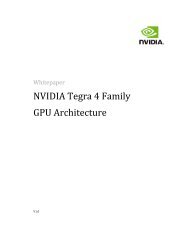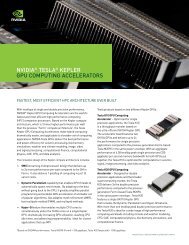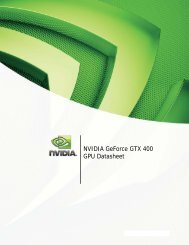CUDA and Fermi Optimization Techniques - nVIDIA
CUDA and Fermi Optimization Techniques - nVIDIA
CUDA and Fermi Optimization Techniques - nVIDIA
Create successful ePaper yourself
Turn your PDF publications into a flip-book with our unique Google optimized e-Paper software.
<strong>CUDA</strong> <strong>and</strong> <strong>Fermi</strong><br />
<strong>Optimization</strong> <strong>Techniques</strong><br />
Hyungon Ryu, PSG SA
Agenda<br />
<strong>CUDA</strong> 101 (General Overview)<br />
Toy of FDM example<br />
Monte Carlo Simulation & Time Series Analysis<br />
General <strong>CUDA</strong> <strong>Optimization</strong> Tips<br />
NVIDIA Confidential
<strong>CUDA</strong> 101<br />
General Overview
<strong>CUDA</strong> 101<br />
<strong>CUDA</strong><br />
Graphics<br />
(GPU)<br />
Parallel<br />
Programming<br />
NVIDIA Confidential
<strong>CUDA</strong> Parallel programming<br />
GPU Knowledge<br />
Cg<br />
OpenGL<br />
DirectX<br />
Parallel knowledge<br />
Pthreads / winthreads<br />
MMX, SSE<br />
OpenMP<br />
PVM / MPI<br />
Hetereogeneous Knowledge<br />
<strong>CUDA</strong><br />
GPU<br />
Parallel DSP<br />
Parallel ASIC<br />
Parallel FPGA<br />
Cell BE<br />
Parallel Computing with GPU<br />
NVIDIA Confidential
Parallel Model in OpenMP<br />
CPU Program<br />
Fork<br />
Parallel<br />
Join<br />
NVIDIA Confidential<br />
6
<strong>CUDA</strong> parallel Model<br />
CPU Program<br />
Kernel Launch<br />
GPU threads<br />
NVIDIA Confidential<br />
7
Saxpy Example : CPU serial<br />
for (int i = 0; i < n; ++i) {<br />
y[i] = a*x[i] + y[i];<br />
}<br />
i<br />
x<br />
yNVIDIA Confidential
Example of Saxpy Parallel : OpenMP<br />
# pragma omp parallel shared (n,a,x,y) private (i)<br />
# pragma omp for<br />
for (int i = 0; i < n; ++i) {<br />
y[i] = a*x[i] + y[i];<br />
}<br />
i<br />
x<br />
yNVIDIA Confidential
Example of Saxpy Parallel : MPI<br />
for ( i = start ; i < end; i++)<br />
{<br />
y[i] = a * x[i] + y[i];<br />
}<br />
MPI_Init(&argc, &argv);<br />
MPI_Comm_rank(MPI_COMM_WORLD,&rank);<br />
MPI_Comm_size(MPI_COMM_WORLD,&size);<br />
i<br />
x<br />
yNVIDIA Confidential<br />
void para_range(int lowest, int highest,int nprocs, int myrank,<br />
int *start, int *end) {<br />
int wk1, wk2;<br />
wk1 = (highest - lowest + 1) / nprocs;<br />
wk2 = (highest - lowest + 1) % nprocs;<br />
*start = myrank * wk1 + lowest + ( (rank rank) *end = *end + 1;<br />
}
Example of Saxpy Parallel : SSE<br />
i<br />
x<br />
yNVIDIA Confidential<br />
void saxpy_vector(short *z, short *x, short *y, short a, unsigned n) {<br />
__m128i* x_ptr = (__m128i*) x;<br />
__m128i* y_ptr = (__m128i*) y;<br />
__m128i* z_ptr = (__m128i*) z;<br />
__m128i a_vec = _mm_splat_epi16(a);<br />
int i;<br />
for (i = 0; i < n/8; ++i) {<br />
__m128i x_vec = x_ptr[i];<br />
__m128i y_vec = y_ptr[i];<br />
__m128i z_vec = _mm_add_epi16( _mm_mullo_epi16 x_vec,a_vec),y_vec);<br />
z_ptr[i] = z_vec;<br />
}<br />
}
Saxpy Parallel : <strong>CUDA</strong><br />
{<br />
x[i] = a * x[i] + t * y[i];<br />
}<br />
Saxpy (n, 2.0, x, y);<br />
i<br />
x<br />
yNVIDIA Confidential
<strong>CUDA</strong> C extension<br />
Launch the kernel<br />
Function > ( parameter);<br />
Additional C st<strong>and</strong>ard API for mem control<br />
cudaXXX : cudaMalloc, cudaMemcpy,<br />
cuXXX : cuMalloc, cuMemcpy<br />
cutXXX : cutXXX<br />
For Function<br />
__global__, __device__, __host__, __device__ __host__<br />
For memory<br />
__shared__, __device__, reg/loc<br />
pre-defined variables<br />
blockDim, blockIdx, threadIdx, cudaMemcpyHostToDevice<br />
Pre-defined function<br />
__syncthreads(), __mul24(); etc 13<br />
NVIDIA Confidential
Process of <strong>CUDA</strong> developing<br />
Serial<br />
Algorithm<br />
serial Programming<br />
Compile<br />
Debugging<br />
Release<br />
<strong>CUDA</strong> parallel<br />
Algorithm<br />
serial Programming<br />
Compile<br />
<strong>CUDA</strong> convert<br />
Profile<br />
Parallelize<br />
Compile<br />
Debugging<br />
Optimize/profile<br />
Release<br />
NVIDIA Confidential<br />
14
<strong>CUDA</strong> is Parallel Computing !!!<br />
Serial MPI parallel <strong>CUDA</strong> parallel<br />
Algorithm<br />
serial Programming<br />
Compile<br />
Debugging<br />
Release<br />
Algorithm<br />
serial Programming<br />
Compile<br />
parallel Programming<br />
Profile<br />
Parallelize<br />
Compile<br />
Debugging [totalview]<br />
Optimize<br />
Release<br />
MPIrun<br />
Algorithm<br />
serial Programming<br />
Compile<br />
<strong>CUDA</strong> convert<br />
Profile<br />
Parallelize<br />
Compile<br />
Debugging<br />
Optimize/profile<br />
Release<br />
NVIDIA Confidential<br />
15
CPU Program<br />
Kernel Launch<br />
SM<br />
I-Cache<br />
MT Issue<br />
C-Cache<br />
Block<br />
TPC<br />
SP<br />
SP<br />
Geometry Controller<br />
I-Cache<br />
MT Issue<br />
C-Cache<br />
SP SP<br />
SMC<br />
I-Cache<br />
MT Issue<br />
C-Cache<br />
SP SP<br />
I-Cache<br />
MT Issue<br />
C-Cache<br />
SP SP<br />
SP<br />
SP<br />
SP<br />
SP<br />
SP<br />
SP<br />
SP<br />
SP<br />
SP SP SP SP SP SP<br />
SP SP SP SP SP SP<br />
SFU SFU SFU SFU SFU SFU<br />
DP DP DP<br />
Shared Shared Shared<br />
Memory Memory Memory<br />
Texture Unit<br />
Tex L1<br />
SP<br />
SP<br />
SP<br />
SP<br />
thread<br />
SFU<br />
SFU<br />
DP<br />
Shared<br />
Memory<br />
NVIDIA Confidential<br />
16
Image Processing Diagram without <strong>CUDA</strong><br />
capture<br />
CPU<br />
Total<br />
time<br />
Camera<br />
For Loop start<br />
For Loop End<br />
NVIDIA Confidential
Image Processing Diagram with <strong>CUDA</strong><br />
Camera<br />
capture<br />
CPU<br />
Memcpy<br />
Total<br />
time<br />
For Loop start<br />
For Loop End<br />
<strong>CUDA</strong> parallel<br />
NVIDIA Confidential
1D Heat Equation<br />
<strong>CUDA</strong> Toy<br />
for undergraduate student
1D Heat Equation<br />
1D bar<br />
NVIDIA Confidential<br />
Heat Source
1D Heat Equation<br />
u<br />
t<br />
<br />
<br />
2<br />
u<br />
2<br />
x<br />
u( 0, t)<br />
u(1,<br />
t)<br />
<br />
0<br />
1D Heat Equation<br />
Boundary condition<br />
u( x,0)<br />
u<br />
0<br />
Initial condition<br />
NVIDIA Confidential
Discretization<br />
u<br />
<br />
t<br />
<br />
2<br />
u<br />
2<br />
x<br />
descretization<br />
u<br />
j, i1<br />
u<br />
j,<br />
i<br />
u<br />
j1,<br />
i<br />
2<br />
t<br />
<br />
<br />
u<br />
x<br />
j,<br />
i<br />
2<br />
<br />
u<br />
j1,<br />
i<br />
Forward difference with second order<br />
i(time), j(space)<br />
relation<br />
u<br />
j, i1<br />
ru<br />
j1,<br />
i<br />
( 1<br />
2r)<br />
u<br />
j,<br />
i<br />
ru<br />
j1,<br />
i<br />
2<br />
r<br />
t<br />
/ x<br />
Explicit method<br />
u[i+1][j] = r*u[i+1][j-1] + (1-2*r)*u[i][j] + r*u[i][j+1];<br />
NVIDIA Confidential
Discretization (stencil)<br />
u<br />
j, i1<br />
ru<br />
j1,<br />
i<br />
( 1<br />
2r)<br />
u<br />
j,<br />
i<br />
ru<br />
j1,<br />
i<br />
j+1,i<br />
r<br />
j,i i+1<br />
(1-2*r)<br />
j-1,i<br />
r<br />
NVIDIA Confidential
Conceptual Diagram<br />
Boundary Condition<br />
Initial Condition<br />
space<br />
13<br />
12<br />
11<br />
10<br />
j+1<br />
r<br />
9<br />
8<br />
7<br />
j<br />
j<br />
6<br />
(1-2*r)<br />
5<br />
stencil<br />
4<br />
r<br />
3<br />
j-1<br />
2<br />
1<br />
Time 0<br />
Update<br />
0<br />
NVIDIA Confidential Time : 0 600<br />
u[i+1][j] = r*u[i+1][j-1] + (1-2*r)*u[i][j] + r*u[i][j+1];
Explicit Pseudo Code<br />
Parameter <strong>and</strong> data Initialization<br />
Stencil, boundary/initial condition,<br />
FOR LOOP (time, i)<br />
FOR LOOP (stencil, j)<br />
Update the stencil relation<br />
Results<br />
u[i+1][j] = r*u[i+1][j-1] + (1-2*r)*u[i][j] + r*u[i][j+1];<br />
NVIDIA Confidential
CPU code<br />
u[i][j] vs. u[j]<br />
u[i][j] easy to develop<br />
Possible to visualize the process<br />
u[j] efficient to use memory<br />
Get the last result<br />
NVIDIA Confidential
Main algorithm<br />
for( i =0; i < N; i++) {<br />
for( j =0; j < M; j++){<br />
Time Iteration<br />
Space Iteration<br />
u[i+1][j] =<br />
r * u[i+1][j-1]<br />
+ (1-2*r) * u[i ][j]<br />
+ r * u[i ][j+1];<br />
}<br />
}<br />
Heat relation<br />
NVIDIA Confidential
Boundary Condition<br />
Method1<br />
N<br />
N-1<br />
copy copy copy<br />
Fixed boundary<br />
Method2<br />
N+1<br />
copy<br />
Free boundary<br />
N<br />
N-1<br />
compute<br />
NVIDIA Confidential
How to Parallelize<br />
13<br />
12<br />
11<br />
10<br />
9<br />
8<br />
7<br />
6<br />
5<br />
4<br />
3<br />
2<br />
1<br />
0<br />
NVIDIA Confidential<br />
Time :<br />
Parallelize the space stencil<br />
Each threads(core) dedicate to each space stencil element<br />
j+1<br />
j<br />
j-1<br />
r<br />
(1-2*r)<br />
r<br />
Time 0<br />
Update<br />
0 600<br />
Not possible to parallelize the time stencil.<br />
j<br />
stencil
How to parallelize<br />
Parameter <strong>and</strong> data Initialization<br />
Stencil, boundary/initial condition,<br />
FOR LOOP (time, i)<br />
FOR LOOP (stencil, j)<br />
Update the stencil relation<br />
Results<br />
NVIDIA Confidential
Space parallelization<br />
Time<br />
Sequence<br />
Time 0<br />
Time 1<br />
Comm<br />
Time 2<br />
Time 3<br />
NVIDIA Confidential
CPUcode<br />
CPU<br />
source<br />
solve<br />
Heat Relation<br />
Boundary Condition<br />
result<br />
NVIDIA Confidential
do{<br />
CPU code<br />
time += dt; printf("aaaaaa %f\n",time);<br />
for(i=1; i < mesh+1; i++){<br />
temper[i].new_1 = (double) (1-2*r)*temper[i].old + r*(temper[i-1].old + temper[i+1].old);<br />
printf("\n processing \t %d %f %f \n",i, temper[i].new_1, temper[i].old);<br />
}<br />
temper[mesh+1].new_1 = temper[mesh-1].new_1;<br />
printf("\t print results %d %f %f \n",mesh+1, temper[mesh+1].new_1,temper[mesh-1].new_1 );<br />
for(i=1; 1 < mesh+2; i++)<br />
temper[i].old = temper[i].new_1; printf("aa\t\t %d %f %f \n",i, temper[i].new_1,temper[i].new_1 );<br />
if((++count % print_step)==0){<br />
printf("hh \t\t\t %10.5lf", time);<br />
for(i=0; i
GPUcode-01 Memory Map<br />
CPU<br />
source<br />
GPU<br />
source<br />
solve<br />
Heat Relation<br />
Boundary Condition<br />
Bypass without solving<br />
result<br />
result<br />
NVIDIA Confidential
GPUcode-01 Malloc Template<br />
double* init_GPU_data(struct flow * temper, int mesh)<br />
{<br />
double *u_dev; // for GPU data upload<br />
size_t gpuMemsize=sizeof(double)*(mesh+2) ;<br />
double *u_host; // temperal value<br />
cudaMalloc( (void**)&u_dev, gpuMemsize);cudaErr("malloc u_dev");<br />
u_host = (double *) malloc( gpuMemsize);<br />
for(int i=0;i
GPUcode-01 Launch Template<br />
void __global__ functionG(double *u_dev, int meshsize, double r, double bound )<br />
{<br />
int idx = blockIdx.x*blockDim.x+threadIdx.x;<br />
int i = idx+1;<br />
if(idx
GPUcode-02 Solving<br />
CPU<br />
GPU<br />
source<br />
source<br />
solve<br />
Heat Relation<br />
Boundary Condition<br />
solve<br />
Heat Relation<br />
Boundary Condition<br />
result<br />
result<br />
NVIDIA Confidential
GPUcode-02 Malloc part<br />
double* init_GPU_data(struct flow * temper, int mesh)<br />
{<br />
double *u_dev; // for GPU data upload<br />
size_t gpuMemsize=sizeof(double)*(mesh+2) ;<br />
double *u_host; // temperal value<br />
cudaMalloc( (void**)&u_dev, gpuMemsize);cudaErr("malloc u_dev");<br />
u_host = (double *) malloc( gpuMemsize);<br />
for(int i=0;i
GPUcode-02 Launch part<br />
void __global__ functionG(double *u_dev, int meshsize, double r, double bound )<br />
{<br />
int idx = blockIdx.x*blockDim.x+threadIdx.x;<br />
int i = idx+1;<br />
if(idx
How to Optimize<br />
NVIDIA Confidential
Monte Carlo Simulation
Computation Time<br />
Malliavin MC results<br />
type Black-Sholes 5000 10000 50000 100000 200000 300000<br />
Price 12.8216 12.8706 12.8721 12.8413 12.8525 12.8559 12.8480<br />
Err 0.000% 0.38% 0.39% 0.15% 0.24% 0.27% 0.21%<br />
Delta 0.5858 0.5724 0.5887 0.5826 0.5826 0.5829 0.5824<br />
Err 0 2.28% -0.51% 0.53% 0.53% 0.49% 0.58%<br />
Gamma 0.0130 0.0112 0.0134 0.0127 0.0127 0.0127 0.0127<br />
Err 0.00% 13.39% -3.34% 2.07% 2.26% 2.21% 2.47%<br />
Total Time 0:00 00:03 00:05 00:25 00:50 01:44 02:33<br />
time : 100 sec<br />
target1 : > 1 sec (100X)<br />
Target2 : >0.001 sec (2000X)<br />
NVIDIA Confidential
Monte Carlo Simulation for Finance<br />
Excel Sheet<br />
Excel VBA<br />
C/C++ dll Link<br />
<strong>CUDA</strong> Acceleration<br />
NVIDIA Confidential
Monte Carlo Code with VBA<br />
function MC( S As Double, X As Double, T As Double, R As Double, _<br />
Vol As Double, Q As Double, No As Double, rtype As String) As Double<br />
Simul_No = No<br />
dt = 1 'dt = 1 / 365<br />
For K = 0 To Simul_No - 1<br />
Juga = S<br />
For i = 0 To MaxStep - 1<br />
Juga = Juga * Exp( (R - Q - Vol ^ 2 / 2) * dt + Vol * Sqr(dt) * MakeNorsD() )<br />
Next<br />
price = Exp(-R * T) * Max(Juga - X, 0)<br />
sum_price = sum_price + price<br />
Next<br />
MC = sum_price / Simul_No<br />
End function<br />
NVIDIA Confidential
Malliavin Greeks<br />
Greek computation for Monte Carlo simulation<br />
E[ f ( S0 S)] E[ f ( S0)]<br />
E[ f ( S)]<br />
<br />
s<br />
S<br />
Malliavin approach<br />
<br />
s<br />
E[ f ( S)] E[ f ( S) W( S)]<br />
Malliavin weights<br />
With Malliavin approach, we can save the computation time.<br />
NVIDIA Confidential
Problem<br />
To compare the accuracy, we compute the Price, Delta <strong>and</strong> Gamma of Vanilla<br />
Call option.<br />
Approach<br />
1. Closed Form solution (VBA,C)<br />
2. Monte (VBA, C)<br />
3. Malliavin (VBA,C, <strong>CUDA</strong> v1, v2)<br />
NVIDIA Confidential
Malliavin Monte Carlo Code with VBA<br />
function Malliavin( S As Double, X As Double, T As Double, R As Double, _<br />
Vol As Double, Q As Double, No As Double, rtype As String) As Double<br />
Simul_No = No<br />
dt = 1 'dt = 1 / 365<br />
For K = 0 To Simul_No - 1<br />
Juga = S<br />
For i = 0 To MaxStep - 1<br />
Juga = Juga * Exp( (R - Q - Vol ^ 2 / 2) * dt + Vol * Sqr(dt) * MakeNorsD() )<br />
Next<br />
WT = (Log(Juga) - Log(S) - (R - Q - 1 / 2 * Vol ^ 2) * T) / Vol<br />
WT_delta = (WT / (S * Vol * T))<br />
WT_gamma = (1 / (Vol * T * S ^ 2)) * (WT ^ 2 / (Vol * T) - WT - 1 / Vol)<br />
price = Exp(-R * T) * Max(Juga - X, 0)<br />
delta = Exp(-R * T) * Max(Juga - X, 0) * WT_delta<br />
gamma = Exp(-R * T) * Max(Juga - X, 0) * WT_gamma<br />
sum_price = sum_price + price<br />
sum_delta = sum_delta + delta<br />
sum_gamma = sum_gamma + Gamma<br />
Next<br />
Malliavin = sum_delta / Simul_No<br />
NVIDIA Confidential
Step1 Malliavin Monte Carlo C language sketch<br />
void Malliavin( double S , double X , double T , double R, double Vol, double Q, long No){<br />
long Simul_No = No;<br />
double dt = 1; // dt = 1 / 365<br />
for ( int K = 0; K< Simul_No - 1 ; K++){<br />
Juga = S ;<br />
for (int i = 0; i< MaxStep - 1 ki++){<br />
Juga = Juga * exp( (R - Q - Vol ^ 2 / 2) * dt + Vol * sqrt(dt) * norm() ); // r<strong>and</strong> with box muller<br />
}<br />
WT = (Log(Juga) - Log(S) - (R - Q - 1 / 2 * Vol ^ 2) * T) / Vol;<br />
WT_delta = (WT / (S * Vol * T));<br />
WT_gamma = (1 / (Vol * T * S ^ 2)) * (WT ^ 2 / (Vol * T) - WT - 1 / Vol);<br />
price = Exp(-R * T) * max(Juga - X, 0);<br />
delta = Exp(-R * T) * max(Juga - X, 0) * WT_delta;<br />
gamma = Exp(-R * T) * max(Juga - X, 0) * WT_gamma;<br />
sum.price = sum.price + price;<br />
sum.delta = sum.delta + delta;<br />
sum.gamma = sum.gamma + Gamma ;<br />
}<br />
r.price = sum.delta / Simul_No<br />
r.delta = sum.delta / Simul_No<br />
r.gamma = sum.delta / Simul_No<br />
NVIDIA return Confidential 0;
Step2 Sketch (kernel part)<br />
Void __global__ Malliavin_compute( double S , double X , double T , double R, double Vol, double Q, long No){<br />
long Simul_No = No;<br />
double dt = 1; // dt = 1 / 365<br />
for ( int K = 0; K< Simul_No - 1 ; K++){<br />
Juga = S ;<br />
for (int i = 0; i< MaxStep - 1 ki++){<br />
Juga = Juga * exp( (R - Q - Vol *Vol / 2) * dt + Vol * sqrt(dt) * norm(k,i) );<br />
}<br />
WT = (log(Juga) - log(S) - (R - Q - 1 / 2 * Vol *Vol) * T) / Vol;<br />
WT_delta = (WT / (S * Vol * T));<br />
WT_gamma = (1 / (Vol * T * S *S)) * (WT*WT / (Vol * T) - WT - 1 / Vol);<br />
Simm_No =<br />
Total Sim /(N threads* M blocks)<br />
price = Exp(-R * T) * max(Juga - X, 0);<br />
delta = Exp(-R * T) * max(Juga - X, 0) * WT_delta;<br />
gamma = Exp(-R * T) * max(Juga - X, 0) * WT_gamma;<br />
sum.price = sum.price + price;<br />
sum.delta = sum.delta + delta;<br />
sum.gamma = sum.gamma + Gamma ;<br />
}<br />
r.price = sum.delta / Simul_No<br />
r.delta = sum.delta / Simul_No<br />
r.gamma = sum.delta / Simul_No<br />
NVIDIA return Confidential 0;<br />
Real Price =<br />
Sum (r.price ) / (N*M)
Step2 Parallel Memory Map<br />
Parallel<br />
cores<br />
uniform<br />
normal<br />
RNG_compute1()<br />
RNG_compute2()<br />
normal()<br />
stock<br />
Malliavin_compute()<br />
option<br />
(float *) __device__ normal(int k, int, j, int size_j, float * normal) {<br />
data in global memory<br />
int index = k*size_j + j;<br />
}<br />
return &normal[index];<br />
NVIDIA Confidential
#include <br />
__global__ RNG_compute(parameter);<br />
__global__ Malliavin_compute(parameter);<br />
main(){<br />
}<br />
Step2 Sketch (host part)<br />
malloc(); //cpu malloc<br />
cudaMalloc(); //GPU malloc<br />
cudaMemcpy(); // transfer<br />
RNG_compute 1 (parameter); // generate RNG (uniform)<br />
RNG_compute2 (parameter); // generate RNG ( BM,Moro)<br />
Malliavin_compute (parameter); // simulation<br />
cudaMemcpy(); //get results<br />
return 0;<br />
NVIDIA Confidential
Step2 Malliavin Monte Carlo <strong>CUDA</strong> language sketch (rng part1)<br />
__global__<br />
static void RNG_r<strong>and</strong>48_get_int(uint2 *state, int *res, int num_blocks, uint2 A, uint2 C)<br />
{<br />
const int nThreads = blockDim.x*gridDim.x;<br />
int nOutIdx = threadIdx.x + blockIdx.x*blockDim.x;<br />
uint2 lstate = state[nOutIdx];<br />
int i;<br />
for (i = 0; i < num_blocks; ++i) {<br />
res[nOutIdx] = ( lstate.x >> 17 ) | ( lstate.y
Step2 Malliavin Monte Carlo <strong>CUDA</strong> language sketch (rng part2)<br />
Void __global__ RNG_compute( int * uniform , float * normal, int length){<br />
int index = blockDim.x*blockIdx.x+threadIdx.x;<br />
__shared__ int s[i];<br />
__shared__ float s_r[i];<br />
if( threadIdx.x ==0){<br />
for (int i = 0 ; i
Box-Muller vs Moro Inversion<br />
__device__ void BoxMuller(float& u1, float& u2){<br />
float r = sqrtf(-2.0f * logf(u1));<br />
float phi = 2 * PI * u2;<br />
u1 = r * __cosf(phi);<br />
u2 = r * __sinf(phi);<br />
}<br />
__device__ Moro( float u ){<br />
// skip the const value<br />
x = u - 0.5;<br />
if (abs(x) < 0.42) {<br />
r = x*x;<br />
r = x * (((a4 * r + a3) * r + a2) * r + a1) / ((((b4 * r + b3) * r + b2) * r + b1) * r + 1);<br />
} else{<br />
if (x > 0) r = log(-log(1 - u));<br />
if (x
Step3 New approach for Direct LCG <strong>and</strong> Parallel Memory Map<br />
Parallel<br />
cores<br />
Malliavin_compute()<br />
r<strong>and</strong>_new(seed)<br />
moro(u)<br />
data in registers<br />
uniform<br />
normal<br />
stock<br />
option<br />
double r<strong>and</strong>_new( int next){<br />
next = (a * next + b) % M;<br />
return (double) next * (1/M);<br />
}<br />
NVIDIA Confidential
Platform for finance<br />
Excel Sheet<br />
Excel VBA<br />
C/C++ dll Link<br />
Socket communication<br />
Grid Manager<br />
12*8 GPU*448 core<br />
= 43,000 core<br />
GPU cluster<br />
12 nodes system (1/2 for backup)<br />
NVIDIA Confidential<br />
8 GPU per node
How to Optimize<br />
NVIDIA Confidential
Time Series Analysis
Multivariate Time-series<br />
m<br />
Corr(1,2)<br />
Corr(1,3)<br />
Corr(2,3)<br />
S(1)<br />
S(2)<br />
S(3)<br />
Corr(1,n)<br />
S(n)<br />
NVIDIA Confidential
How to parallelize with <strong>CUDA</strong><br />
S(1)<br />
serialize<br />
S(2)<br />
S(3)<br />
S(n)<br />
NVIDIA Confidential<br />
Unefficient approach for Shared Memory Usage
How to parallelize with <strong>CUDA</strong><br />
S(1)<br />
S(2)<br />
serialize<br />
S(3)<br />
S(n)<br />
NVIDIA Confidential<br />
efficient approach for Shared Memory Usage<br />
Need to reduction technique for mean etc.
How to parallelize with <strong>CUDA</strong><br />
S(1)<br />
S(2)<br />
Parallelize<br />
With<br />
multiNode<br />
multiGPU<br />
serialize<br />
S(3)<br />
S(n)<br />
Good method for multiGPU & large Cluster<br />
NVIDIA Confidential
In pair(I,J), Pearson Correlation Coefficient<br />
<br />
<br />
<br />
<br />
( x x)( y y)<br />
i<br />
( x x) ( y y)<br />
i<br />
<br />
i<br />
2 2<br />
i<br />
i i i i i i <br />
<br />
( x x)( y y)<br />
x y x y y x xy<br />
<br />
<br />
<br />
<br />
<br />
<br />
<br />
x y<br />
i<br />
i<br />
nxy<br />
( x x)<br />
x nx<br />
i<br />
2 2 2<br />
i<br />
( y y)<br />
y ny<br />
i<br />
i<br />
x y<br />
i<br />
2 2 2<br />
i<br />
nxy<br />
<br />
2 2 2 2<br />
( xi<br />
nx )( yi<br />
ny<br />
)<br />
NVIDIA Confidential<br />
We can parallelize the Sumation !!<br />
After sumation, find the mean.
How to parallelize with <strong>CUDA</strong> : Flow Chart<br />
Method 1 Method 2<br />
Input A, B<br />
Find the mean of A, B<br />
start to sum (Ai), (Bi)<br />
Find Cov(A,B), Cov(A,A), Cov(B,B)<br />
start to sum (Ai,Bi), (Ai^2), (Bi^2) with mean<br />
Input A, B<br />
Start to sum (Ai), (Bi), (Ai,Bi), (Ai^2), (Bi^2)<br />
Find the mean of A, B<br />
Find Cov(A,B), Cov(A,A), Cov(B,B)<br />
Benefit : Easy to implementation<br />
with two function<br />
Benefit : oneshot sum (speed-up)<br />
R+<strong>CUDA</strong> project<br />
http://brainarray.mbni.med.umich.edu/Brainarray/rgpgpu/<br />
NVIDIA Confidential
In pair(i,j), Pearson Correlation Coefficient<br />
FOR (i, j) – pair : serial<br />
FOR k (time-series) : parallel<br />
x<br />
compute<br />
i<br />
y<br />
i<br />
xy<br />
i i<br />
2<br />
x i<br />
2<br />
y i<br />
reduction for results<br />
compute mean(i), mean(j),<br />
compute cov(i,j), cov(i,i) ,cov(j,j)<br />
compute corr(i,j)<br />
NVIDIA Confidential
In pair(i,j), Pearson Correlation Coefficient<br />
FOR (i, j) – pair : serial<br />
FOR k (time-series) : parallel<br />
FOR shared memory<br />
<br />
compute<br />
x i<br />
yi<br />
xy<br />
i i<br />
2<br />
x i<br />
2<br />
y i<br />
reduction for results<br />
compute mean(i), mean(j),<br />
compute cov(i,j), cov(i,i) ,cov(j,j)<br />
compute corr(i,j)<br />
NVIDIA Confidential
How to Optimize<br />
NVIDIA Confidential
Focus on <strong>Optimization</strong>
System <strong>Optimization</strong> Tips before<br />
start <strong>CUDA</strong> programming
Remote Use<br />
snapshot of<br />
real ccreen<br />
VNC<br />
WDDM<br />
VNC protocol<br />
VNC<br />
<strong>CUDA</strong><br />
enabled<br />
Remote Host<br />
Client<br />
intercept the<br />
<strong>CUDA</strong> driver<br />
Remote Host<br />
RDP driver<br />
WDDM<br />
RDP protocol<br />
RDP<br />
Client<br />
<strong>CUDA</strong><br />
disabled<br />
NVIDIA Confidential
TCC driver<br />
<strong>CUDA</strong> Application<br />
GPU<br />
result<br />
RDP driver<br />
RDP protocol<br />
RDP<br />
WDM<br />
WDDM<br />
<strong>CUDA</strong><br />
enabled<br />
Remote Host<br />
Client<br />
NVIDIA Confidential<br />
• Remote Desktop<br />
• Kernel Launch Over Head<br />
• GPU exclusive Mode<br />
• Windows Service for Session0/1<br />
• large single Malloc
GPU exclusive Mode for multiuser<br />
GPU 3<br />
GPU 2<br />
GPU 1<br />
GPU 0<br />
Server<br />
GPU Pool<br />
Remote users<br />
Remote users<br />
Remote users<br />
NVIDIA Confidential
GPUDirect for GPU cluster<br />
MPI Communication<br />
System Pinned Memory<br />
System Pageable Memory<br />
System Pinned Memory share<br />
NVIDIA Confidential
FBO on SDI with Quadro<br />
Third Party<br />
SDI Input<br />
Third Party<br />
SDI Input<br />
CPU<br />
Memory<br />
Controller<br />
System<br />
Memory<br />
NVIDIA Graphics Card<br />
Video<br />
Memory<br />
GPU<br />
DVI<br />
DVI<br />
CPU<br />
Memory<br />
Controller<br />
System<br />
Memory<br />
NVIDIA Graphics Card<br />
Video<br />
Memory<br />
GPU<br />
DVI<br />
DVI<br />
NVIDIA SDI Output<br />
DVI<br />
NVIDIA SDI Output<br />
DVI<br />
Write to Host memory <strong>and</strong> to write GPU memory<br />
Direct write to OpenGL Frame Buffer Object<br />
NVIDIA Confidential
Conceptual Tips for<br />
<strong>CUDA</strong> optimization
SIMT architecture<br />
Single Instruction Multiple Threads
Abstract overview of CPU Core<br />
CPU<br />
Memory Bank<br />
inst. fetch<br />
Register Bank<br />
L1<br />
inst. cache<br />
RDX<br />
RCX<br />
RBX<br />
RAX<br />
FPU<br />
ALU<br />
LSU<br />
L1<br />
data cache<br />
NVIDIA Confidential
Threads on Multicore CPU<br />
CPU<br />
Core<br />
reg<br />
CPU<br />
General Programming<br />
TH<br />
Core<br />
reg<br />
CPU<br />
Winthread, pthread<br />
TH<br />
TH<br />
Core<br />
reg<br />
CPU<br />
Hyper-threading<br />
NVIDIA Confidential<br />
TH<br />
TH<br />
TH<br />
TH
Threads on Manicore GPU<br />
H/W Multi Processor vs<br />
S/W Active Block<br />
SP<br />
reg<br />
MP<br />
TH TH TH TH TH TH TH TH TH TH<br />
Block Block Block<br />
SP<br />
reg<br />
MP<br />
TH TH TH TH TH<br />
NVIDIA Confidential<br />
Block<br />
Block<br />
79
Overview of WARP schedule<br />
<br />
<br />
<br />
schedule <br />
<br />
<br />
Warp 0<br />
MP<br />
warp<br />
threads<br />
8 SP core<br />
NVIDIA Confidential<br />
Register<br />
per threads
Overview of Instruction Fetch<br />
0 1 2 3<br />
4 5 6 7<br />
blockIdx.x=0, threadIdx.x=3<br />
Load A, B<br />
FP operation<br />
ADD<br />
Store C<br />
cores<br />
0 1 2 3 4 5 6 7<br />
NVIDIA Confidential
Overview of Instruction Fetch<br />
0 1 2 3<br />
4 5 6 7<br />
blockIdx.x=0, threadIdx.x=4<br />
Load A, B<br />
FP operation<br />
ADD<br />
Store C<br />
cores<br />
0 1 2 3 4 5 6 7<br />
NVIDIA Confidential
Thread schedule within MP : WARP<br />
MP<br />
1024 * 30 : 30K<br />
B1<br />
Look like<br />
Cocurrent<br />
Threads<br />
WARP<br />
B2<br />
NVIDIA Confidential
Occupancy Calculator on <strong>CUDA</strong> SDK<br />
NVIDIA Confidential
<strong>CUDA</strong> profiler on <strong>CUDA</strong> toolkit<br />
NVIDIA Confidential
Parallel NSight 1.5 Professional<br />
NVIDIA Confidential
Memory Hierarchy
Managing Memory<br />
Host<br />
DRAM<br />
CPU<br />
Chipset<br />
Device<br />
DRAM<br />
Local<br />
Memory<br />
Global<br />
Memory<br />
GPU<br />
Multiprocessor<br />
Multiprocessor<br />
Multiprocessor<br />
Registers<br />
Shared Memory<br />
L2 Cache<br />
L1 Cache<br />
NVIDIA Confidential<br />
B<strong>and</strong>width<br />
Size
96 x 96<br />
384 x 384<br />
672 x 672<br />
960 x 960<br />
1248 x 1248<br />
1536 x 1536<br />
1824 x 1824<br />
2112 x 2112<br />
2400 x 2400<br />
2688 x 2688<br />
2976 x 2976<br />
3264 x 3264<br />
3552 x 3552<br />
3840 x 3840<br />
4128 x 4128<br />
4416 x 4416<br />
4704 x 4704<br />
4992 x 4992<br />
5280 x 5280<br />
5568 x 5568<br />
5856 x 5856<br />
6144 x 6144<br />
6432 x 6432<br />
6720 x 6720<br />
7008 x 7008<br />
7296 x 7296<br />
7584 x 7584<br />
7872 x 7872<br />
8160 x 8160<br />
8448 x 8448<br />
64 x 64<br />
384 x 384<br />
704 x 704<br />
1024 x 1024<br />
1344 x 1344<br />
1664 x 1664<br />
1984 x 1984<br />
2304 x 2304<br />
2624 x 2624<br />
2944 x 2944<br />
3264 x 3264<br />
3584 x 3584<br />
3904 x 3904<br />
4224 x 4224<br />
4544 x 4544<br />
4864 x 4864<br />
5184 x 5184<br />
5504 x 5504<br />
5824 x 5824<br />
6144 x 6144<br />
6464 x 6464<br />
6784 x 6784<br />
7104 x 7104<br />
7424 x 7424<br />
7744 x 7744<br />
8064 x 8064<br />
8384 x 8384<br />
Matrix Size for Best CUBLAS3.2 Performance<br />
Gflops SGEMM: Multiples of 96<br />
650<br />
600<br />
550<br />
500<br />
450<br />
400<br />
350<br />
300<br />
250<br />
200<br />
150<br />
100<br />
50<br />
0<br />
Gflops DGEMM: Multiples of 64<br />
350<br />
300<br />
250<br />
200<br />
150<br />
100<br />
50<br />
0<br />
NVIDIA Confidential<br />
cuBLAS 3.2: NVIDIA Tesla C1060, Tesla C2050 (<strong>Fermi</strong>)<br />
MKL 10.2.4.32: Quad-Core Intel Xeon 5550, 2.67 GHz
64 x 64<br />
128 x 128<br />
192 x 192<br />
256 x 256<br />
320 x 320<br />
384 x 384<br />
448 x 448<br />
512 x 512<br />
576 x 576<br />
640 x 640<br />
704 x 704<br />
768 x 768<br />
832 x 832<br />
896 x 896<br />
960 x 960<br />
1024 x 1024<br />
1088 x 1088<br />
1152 x 1152<br />
1216 x 1216<br />
1280 x 1280<br />
1344 x 1344<br />
1408 x 1408<br />
1472 x 1472<br />
1536 x 1536<br />
1600 x 1600<br />
1664 x 1664<br />
1728 x 1728<br />
1792 x 1792<br />
1856 x 1856<br />
1920 x 1920<br />
1984 x 1984<br />
2048 x 2048<br />
2112 x 2112<br />
2176 x 2176<br />
2240 x 2240<br />
2304 x 2304<br />
2368 x 2368<br />
2432 x 2432<br />
2496 x 2496<br />
2560 x 2560<br />
2624 x 2624<br />
2688 x 2688<br />
2752 x 2752<br />
2816 x 2816<br />
2880 x 2880<br />
2944 x 2944<br />
3008 x 3008<br />
3072 x 3072<br />
3136 x 3136<br />
3200 x 3200<br />
3264 x 3264<br />
3328 x 3328<br />
3392 x 3392<br />
Gflops<br />
cuBLAS level III<br />
350<br />
300<br />
250<br />
200<br />
150<br />
100<br />
50<br />
0<br />
DGEMM: Multiples of 64<br />
NVIDIA Confidential<br />
cuBLAS 3.2: NVIDIA Tesla C1060, Tesla C2050 (<strong>Fermi</strong>)<br />
MKL 10.2.4.32: Quad-Core Intel Xeon 5550, 2.67 GHz
Roofline Analysis (Arithmetic Intensity)<br />
Samuel Williams, Andrew Waterman, <strong>and</strong> Dav id Patterson,<br />
Roofline: An Insightful Visual Performance Model for Multicore Architectures<br />
NVIDIA Confidential
Perf. on <strong>CUDA</strong> Application<br />
Gflops<br />
B<strong>and</strong>width of PCI-e slot<br />
Ns<br />
B<strong>and</strong>width of Global Memory<br />
NVIDIA Confidential<br />
F/B
Tips for <strong>Optimization</strong><br />
Consider Algorithm for parallel (naïve algorithms will be good)<br />
Consider Occupancy ( SIMT)<br />
Consider Memory Bottleneck<br />
NVIDIA Confidential
More Information for <strong>CUDA</strong> <strong>Optimization</strong><br />
<strong>CUDA</strong> Zone<br />
http://www.nvidia.com/<strong>CUDA</strong><br />
Developer Zone<br />
http://developer.nvidia.com<br />
GTC 2010 contents<br />
http://www.nvidia.com/gtc2010-content<br />
쿠다 카페 (<strong>CUDA</strong> café in Korea)<br />
NVIDIA Confidential<br />
http://cafe.daum.net/KCUG
Thanks<br />
Hyungon Ryu<br />
hryu@nvidia.com
















